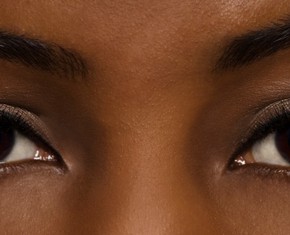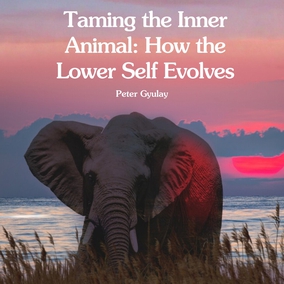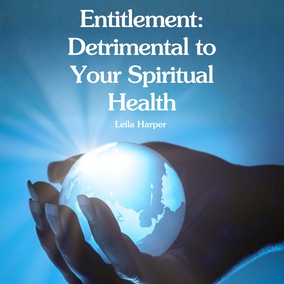The views expressed in our content reflect individual perspectives and do not represent the authoritative views of the Baha'i Faith.
“Why me?” I asked the universe. “Why not you?” the universe replied.
It’s easy to blame others or “things” for our problems, and not look at ourselves first. Avoiding personal responsibility for our actions—whether being fired from a job, losing retirement savings in the Great Recession, or the actions of an errant child—our first tendency is to look for external causes, and not finding a clear one, blame the mean boss, “the system,” the doctor, or even God.
I’m not saying we are the cause of all the problems that affect us, for at times we are not.
Often we get caught up in events and circumstances beyond our control. But at times, depending on the problem or issue, especially when others take umbrage with us, we are the cause, directly or inadvertently. Unable to see ourselves as the source of the problem, we retreat into denial and the blame game.
Once we realize the limits of our actual control over life events, it can comfort us to know that we do not bring all horrors on ourselves. The sinking of the Titanic in the frigid Atlantic Ocean in 1912 was a tragedy, but was it caused by human error—or an iceberg? Daily tragedies beset us, like the recent devastating earthquake in Ecuador, or one a year ago in Nepal, or in Haiti in 2010. We naturally ask, “Why did this happen? Why must so many men, women and children suffer so? How could God let this happen?”
The corollary is, “If God is loving and kind, how could He allow this to happen?”
I’d like to suggest a simple answer: He didn’t, and He doesn’t, and He never will.
If God did wreak havoc and disaster and suffering on humanity, how could He be All-loving, All-Merciful, All-Forgiving? Can we even conceive of a God who is All-Evil, All-Vengeful, All-Diabolical? No. He would cease being God, according to all religious traditions.
In the case of natural disasters, science and our own intelligence teaches us to neither blame God nor mindless and relentless nature. When we understand God as the initial impulse for all creation, we also understand God as the creator of our self-motivation, self-determination, self-awareness and free will. We know that God gave human beings those intelligent and creative attributes to overcome the myriad forces imposed or exacted by nature. We know that we can anticipate disasters, prepare for them and save lives as a result.
God is not responsible for our personal problems or deficiencies, whether individually or collectively, because we each and all are products of our environment—the natural order we find ourselves a part of, and nature’s environment, beginning at birth. Is God responsible for the pain in my left shoulder caused by a fall? Or for the mentally deranged who hear voices and murder? Or those who incite others to violence as “religious” terrorists? Most would agree not.
The difference, of course, is motivation. Nature has a rigid motivating force–to grow, shift, change and adapt. Nature is not concerned with justice and fairness and the altruism we see in humanity. People all have an animal nature as well, which motivates us to do things from one extreme to the other, some extremely kind, others evil. But even though the animals live according to circumscribed natural tendencies, we can rise above our animal nature and control some of these decisions—we have the free will to act on our conscience and choose justice or injustice:
Certain matters are subject to the free will of man, such as acting with justice and fairness, or injustice and iniquity—in other words, the choice of good or evil actions. It is clear and evident that the will of man figures greatly in these actions. But there are certain matters where man is forced and compelled, such as sleep, death, sickness, failing powers, misfortune and material loss: These are not subject to the will of man and he is not accountable for them, for he is compelled to endure them. But he is free in the choice of good and evil actions, and it is of his own accord that he performs them. – Abdu’l-Baha, Some Answered Questions, newly revised edition, p. 287.
So why, although I try to be good, does trouble still assail me? Tune in for the second part of this essay, when we’ll try to answer that big question.
Next: Why Does God Still Pick on Me?
You May Also Like
Comments

















Hindu answers to the problem of evil are different from most answers offered in Western philosophy, partly because the problem of evil within Hindu thought is differently structured than Western traditions, mainly Abrahamic traditions.
In the Hindu tradition the problem of evil is phrased as the Problem of Injustice. This problem can be considered in the following manner:
God is omnipotent, omniscient, and just. Yet injustice is observed to persist in the world. How is this possible?
In the Advaita school ...of Vedanta, this problem is dealt with in detail by Sankara in his commentary on the Brahma Sutras, 2.1.34–36:
Brahma Sutra 2.1.34: "No partiality and cruelty (can be charged against God) because of (His) taking other factors into consideration."
Sankara's commentary explains that God cannot be charged with partiality or cruelty (i.e. injustice) on account of his taking the factors of virtuous and vicious actions (karma) performed by an individual in previous lives. If an individual experiences pleasure or pain in this life, it is due to virtuous or vicious action (karma) done by that individual in a past life.
Brahma Sutra 2.1.35: "If it be argued that it is not possible (to take Karma into consideration in the beginning), since the fruits of work remain still undifferentiated, then we say, no, since the transmigratory state has no beginning."
The opponent now argues that there could have been no "previous birth" at the very beginning of creation, before which karma could not have existed. Sankara replies that it is not so, for the number of creation cycles is beginningless; see the next verse:
Brahma Sutra 2.1.36: "Moreover, this is logical, and (so) it is met with (in the scriptures)."
Sankara provides references from the Vedas concerning the beginninglessness of Creation: "The Ordainer created the sun and moon like those of previous cycles" (Rig Veda 10.190.3). This shows the existence of earlier cycles of creation, and hence the number of creation cycles is beginningless.
Thus Sankara's resolution to the Problem of Injustice is that the existence of injustice in the world is only apparent, for one merely reaps the results of one's moral actions sown in a past life, which is compatible with the Justness of an Omniscient and Omnipotent God.
On the higher level of existence, however, there is no evil or good, since these are dependent mainly on temporal circumstances. Hence a jnani, one who has realized his true nature, is beyond such dualistic notions.
Sankara used this as an argument for the existence of God. He argued that the original karmic actions themselves cannot bring about the proper results at some future time; neither can super sensuous, non-intelligent qualities like adrsta—an unseen force being the metaphysical link between work and its result—by themselves mediate the appropriate, justly deserved pleasure and pain. The fruits, according to him, then, must be administered through the action of a conscious agent, namely, a supreme being (Ishvara).
Another view is that the problem of evil is present but does not exist per se as souls are eternal and not directly created by God. In Dvaita (dual) philosophy, jivas (souls) are eternally existent and hence not a creation of God ex nihilo (out of nothing). The souls are bound by beginningless avidya (ignorance) that causes a misidentification with products of nature (body, wealth, power) and hence suffering. In effect, Hinduism identifies avidya (ignorance) as the cause of evil, and this ignorance itself is uncaused. Suffering from natural causes is explained as a natural karmic result of previous births.
Moreover, even within the realm of avidya, good and evil are an individual's deeds, and God dispenses the results of an individual's actions but has the power to mitigate suffering. Advaita (non-dual) mysticism maintains that every seemingly separate person is in fact a thought, dream, or experience of God; God creates and becomes / experiences each creation, deliberately limiting it to a specific identity in space and time to undergo a particular life experience. In Advaita, it is God who experiences every pain, suffers every indignity, dies every death, and experiences the illusion of being each separate individual.
A human's karmic acts result in merits and demerits. Since unconscious things generally do not move except when caused by an agent (for example, the ax moves only when swung by an agent), and since the law of karma is an unintelligent and unconscious law, Sankara argues there must be a conscious supreme Being who knows the merits and demerits which persons have earned by their actions, and who functions as an instrumental cause in helping individuals reap their appropriate fruits. Thus, God affects the person's environment, even to its atoms, and for those souls who reincarnate, produces the appropriate rebirth body, all in order that the person might have the karmically appropriate experiences. Thus, there must be a theistic administrator or supervisor for karma, i.e., God.
The Nyaya school, one of six orthodox schools of Hindu philosophy, states that one of the proofs of the existence of God is karma; It is seen that some people in this world are happy, some are in misery. Some are rich and some poor. The Naiyanikas explain this by the concept of karma and reincarnation. The fruit of an individual's actions does not always lie within the reach of the individual who is the agent; there ought to be, therefore, a dispenser of the fruits of actions, and this supreme dispenser is God. This belief of Nyaya, accordingly, is the same as that of Vedanta.
Christian Science, which I have mentioned previously also has a stance on the problem of evil.
Christian Science views evil as having no ultimate reality and as being due to false beliefs, consciously or unconsciously held. Evils such as illness and death may be banished by correct understanding. This view has been questioned, aside from the general criticisms of the concept of evil as an illusion discussed earlier, since the presumably correct understanding by Christian Science members, including the founder, has not prevented illness and death. However, Christian Scientists believe that the many instances of spiritual healing (as recounted e.g. in the Christian Science periodicals and in the textbook Science and Health with Key to the Scriptures by Mary Baker Eddy) are anecdotal evidence of the correctness of the teaching of the unreality of evil. According to one author, the denial by Christian Scientists that evil ultimately exists neatly solves the problem of evil; however, most people cannot accept that solution.
I am positive you didn't mean to trivialize anybody's trials, and I didn't sense that vibration coming from you last evening. I can relate to any sensitivity Susan or anybody might have about perceived dismissal, because that's been a life-long issue for me, too. There are countless people, some of them Baha'is, who are without a clue about others' agony. Susan's reply just reminds me of how vulnerable we all are; I see no fault from either end, only a little misperception at one point. That can happen so easily, because we are ...fragile creatures! Empathy is a fundamental goal of our growth.
I'd like to comment more on some things you or Stephen talked about:
Suffering can come either from evil or from things outside of evil, like the asteroid. As you said, "evil" is often used wrongly. I think Baha'i scriptures make it obvious the only possible source of evil is the human ego. Strictly speaking, maybe even awful acts born of delusional thinking
should no longer be considered evil, because they're not driven by a consciously willful ego. Civil law definitely sees a difference there. As far as the other animals go, they don't have free will or ego, and so couldn't be morally accountable. I know Abdu'l-Baha talks about the "blessed" animals and the harmful kind, like your rattlesnake, but I'm sure that's only about physical risk.
I'm glad to have just set things up for a brief rant I'd like to make about the "non-existence of evil". If Susan and Stephen are there, they could find it interesting. Gary Matthews wrote "The Metropolis of Satan" as a reality check for his fellow Baha'is. He pointed out that the chapter called "The Nonexistence of Evil" in "Some Answered Questions" by Abdu'l-Baha is wrongly read by some, in contradiction to the spirit of many other Baha'i passages. Abdu'l-Baha did not have his head in the clouds or the sand; he was very practical, and I can't imagine him easily dismissing evil. That chapter was only explaining that all things come from God and thus aren't inherently evil, but that some can interact with others in a harmful way. Those toxic snakes and the like are mentioned as an example. Abdu'l-Baha is also saying that technically evil is only the absence of good. Mr. Matthews reminds us that too much literalism here is not very satisfying to victims of mistreatment, nor of course to victims of natural mishap.
"In conclusion", as they say somewhere near the end, I would like to mention a distinction between two kinds of suffering that M. Scott Peck made. He credited Carl Jung as his inspiration. Mr. Peck said there is "legitimate suffering" that we all should go through; it's the inner struggle toward improvement and growth. If we try to avoid it, we will only bring the other kind, "neurotic suffering", on ourselves later. Obviously, there would tend to be negative fallout on the people around us, too. I know the concept only encompasses the realm of human accountability and not Nature, but, mental illness aside, should we be thinking of past and present tyrants as people who avoided doing their "inner work"?
To be technical about it, I think we have to say that God actually does allow the misfortunes, whether they are our fault or beyond our control. I'm not mad at Him for it, but if He's in fact omnipotent, then He not only created "mindless and relentless nature" and the forces and laws it goes by, but He also could intervene any time ...He chose. The only description of His role in physical life that satisfies me makes Him the initial Creator and Life-giver Who provides guidance through His prophets, but otherwise generally leaves us alone to make our own choices. Even this idea does not satisfy our desire for justice, though, because of the suffering of innocents by any means, natural law or human negligence. Resolution to all this can't be found on the wordly plane by any theory; assistance John Hatcher treated so well in "The Purpose of Physical Reality", I think closure on the Divine justice issue demands detachment and a consideration of the afterlife.
Of course it's true that our God-given creative minds have saved us from much physical hardship and calamity, but I fear it could be a long time before we can divert huge asteroids or stifle major earthquakes without messing ourselves up in some unexpected way. In the meantime, we'd best keep working on detachment, too. I'm joking, because whatever threat we may conquer, physical death will be an eternal "given".
Steve, your feeling that God "allows" misfortune is well taken, part of my premise of Why would a benevolent loving God allow 1) evil, and 2) suffering? when in our belief systems, He has the power to prevent such things. And I am not answering the question Why do we suffer? that's been written by countless others. But an asteroid has no will of its own, and hasn't "chosen" to crash into ...us; it is a physical, natural phenomena. A probability real, not Hollywood, scientists have been studying. We can prepare somewhat for probabilities such as that since we have been struck and know it could happen, yet preparing for possibilities, on the other hand, is a zero sum game, without end or probable success. I love the armed forces, who justify arms races with "We have to prepare for the unforeseen." If it's unforeseen, how do you prepare? No, we prepare for probabilities, yes, we must. But I do feel as I think I perceive you do also, that it is God's Love for creation that in fact keeps all existence in existence. Human beings free will, however, without question, allows or disallows suffering, and we have, thankfully, many more folks trying to alleviate it than to add to it.
To say that God is not responsible for ANY human suffering is inane at best. First off, God created a universe in which people will suffer. Worse yet, some people suffer very little and some suffer a lot more through no fault of their own, and in spite of struggling for their entire lives ...to make their lives better. To say that makes us stronger, etc., does little good for those who are so depressed they cannot even do anything to contribute to society, even though they want to.
I have been a Baha’i for 45 years and I have been able to do nothing with the Faith because of my suffering which has been almost constant. To say that there is recompense in some afterlife that cannot even be proven to exist is really of no help at all, not for me anyway.
The theory of karma holds that good acts result in pleasure and bad acts with suffering. Thus it accepts that there is suffering in the world, but maintains that there is no undeserved suffering, and in that sense, no evil. The obvious objection that people sometimes suffer misfortune that was undeserved is met with by coupling karma with reincarnation, so that such suffering is the result of actions in previous lifetimes. The real problem of evil is the desire to invert the law of karma by way ...of causing suffering to the innocent, and rewarding pleasure to the guilty as superimposed rule.
It is possible to hold that evils such as suffering and disease are mere illusions, and that we are mistaken about the existence of evil. This approach is favored by some Eastern religious philosophies such as Hinduism and Buddhism, and by Christian Science. It is most plausible when considering our knowledge of evils which are geographically or temporally distant, for these might not be real after all. However, when considering our own sensations of pain and mental anguish, there does not seem to be a difference in apprehending that we are afflicted by such sensations and suffering under their influence. If that is the case, it seems that not all evils can be dismissed as illusory.
In Buddhism, the problem of evil, or the related problem of dukkha, is one argument against a benevolent, omnipotent creator god, identifying such a notion as attachment to a false concept.
The problem of evil is mostly a thing Westerners and/or people who follow Western religions have to deal with.